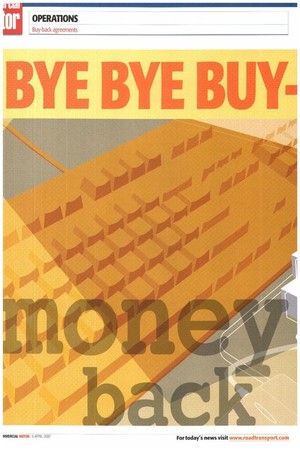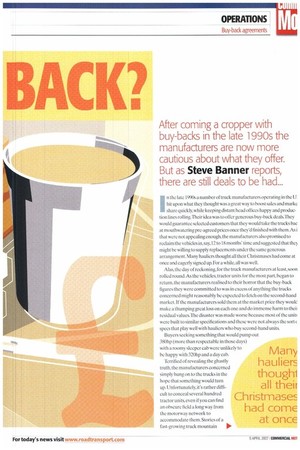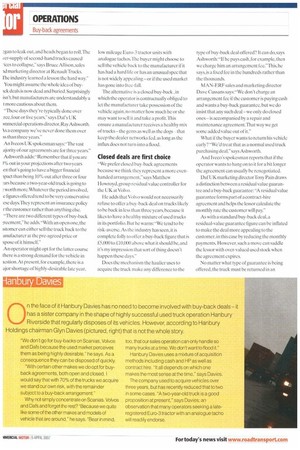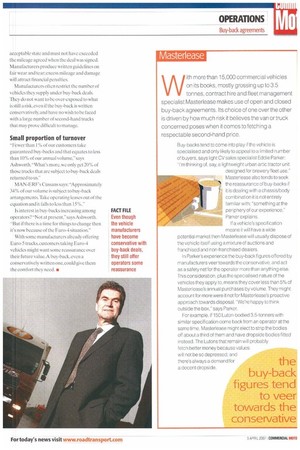BYE BYE BUY BACK?
Page 52

Page 53

Page 54

Page 55

If you've noticed an error in this article please click here to report it so we can fix it.
After coming a cropper with buy-backs in the late 1990s the manufacturers are now more cautious about what they offer.
But as Steve Banner reports, there are still deals to be had...
n the late 1990s a number of truck manufacturers operating in the ET Int upon what they thought was a great way to boost sales and markc share quickly, while keeping distant head offices happy and production lines rolling.Their idea was to offer generous buy-back deats.They would guarantee selected customers that they would take the trucks bac at mouthwatering pre-agreed prices once they'd finished with them. As i that were not appealing enough, the manufacturers also promised to reclaim the vehicles in,say,12 to 18 months' time and suggested that the) might be willing to supply replacements under the same generous arrangement. Many hauliers thought all their Christmases had come at once and eagerly signed up. For a while, all was well.
Alas, the day of reckoning, for the truck manufacturers at least, soon rolled round. As the vehicles, tractor units for the most part, began to return, the manufacturers realised to their horror that the buy-back figures they were committed to was in excess of anything the trucks concerned might reasonably be expected to fetch on the second-hand market. If the manufacturers sold them at the market price they woulC make a thumping great loss on each one and do immense harm to theii residual values.The disaster was made worse because most of the unib were built to similar specifications and these were not always the sort c specs that play well with hauliers who buy second-hand units.
Buyers seeking something that would pump out 380hp (more than respectable in those days) with a roomy sleeper cab were unlikely to be happy with 320hp and a day cab. Mani Terrified of revealing the ghastly hauliers simply hung on to the trucks in the thoughi hope that something would turn up. Unfortunately, it's rather diffiail their tractor units, even if you can find cult to conceal several hundred Christmases an obscure field a long way from had come the motorway network to accommodate them. Stories of a at once fast-growing truck mountain PO. gati to leak out, and heads began to roll The ver-supply of second-hand trucks caused -ices to collapse," says Bruce A Ilison,sales id marketing director at Renault Trucks. Ihe industry learned a lesson the hard way." You might assume the whole idea of buyick deals is now dead and buried. Surprisingly isn't, but manufacturers are understandably a t more cautious about them.
"These days they're typically done over ree, four or five years," says Dais UK nrunercial operations director,RayAshworth. ks a company we've never done them over ss than three years."
An Ivecos UK spokesman says: "The vast ajority of our agreements are for three years." Ashworth adds:"Remember that if you are 1% out in your projections after two years en that's going to have a bigger financial ipact than being 10% out after three or four :ars because a two-year-old truck is going to ; worth more.Whatever the period involved, e figures offered tend to he very conservative ese days.They represent an insurance policy r the customer rather than anything else. "There are two different types of buy-back ;reernent," he adds."With an open one, the istorner can either sell the truck back to the an ufacturer at the pre-agreed price or spose of it himself."
An operator might opt for the latter course there is a strong demand for the vehicle in testion. At present, for example, there is a ajor shortage of highly-desirable late year, low mileage Euro-3 tractor units with analogue tachos.'lhe buyer might choose to sell the vehicle back to the manufacturer if it has had a hard life or has an unusual spec that is not widely appealing—or if the used market has gone into free-fall.
The alternative is a closed buy-back , in which the operator is contractually obliged to let the manufacturer take possession of the vehicle again, no matter how much he or she may want to sell it and take a profit.This ensure a manufacturer receives a healthy mix of trucks— the gems as well as the dogs -that keep the dealer networks fed, as long as the influx does not turn into a flood.
Closed deals are first choice
"We prefer closed buy-back agreements because we think they represent a more evenhanded arrangement," says Matthew I lowroyd, group residual value controller for the UK at Volvo.
He adds that Volvo would not necessarily refuse to offer a buy-back deal on trucks likely to he back in less than three years, because it likes to have a healthy mixture of used trucks in its portfolio. But he warns:"We tend to be risk-averse. As the industry has seen, it is complete folly to offer a buy-back figure that is £5,000 to £10,000 above what it should be,and it's my impression that sort of thing doesn't happen these days."
Does the mechanism the haulier uses to acquire the truck make any difference to the type of buy-back deal offered? It can do, says Ashworth:"If he pays cash, for example, then we charge him an arrangement fee."This, he says,is a fixed fee in the hundreds rather than the thousands.
MAN-ERF sales and marketing director Dave Cussanssays:"We don't charge an arrangement fee if the customer is paying cash and wants a buy-back guarantee, but we do insist that any such deal—we only do closed ones—is accompanied by a repair and maintenance agreement.That way we get some added value out of it."
What if the buyer wants to return his vehicle early? "We'd treat that as a normal used truck purchasing deal." says Ashworth.
And Iveco's spokesman reports that if the operator wants to hang on to it for a bit longer the agreement can usually be renegotiated.
Daf UK marketing director Tony Pain draws a distinction between a residual value guarantee and a buy-back guarantee: "A residual value guarantee forms part of a contract-hire agreement and helps the lessor calculate the monthly rate the customer will pay."
As with a standard buy-back deal, a residual-value guarantee figure can be inflated to make the deal more appealing to the customer, in this case by reducing the monthly payments. However, such a move can saddle the lessor with over-valued used stock when the agreement expires.
No matter what type of guarantee is being offered, the truck must be returned in an acceptable state and must not have exceeded the mileage agreed when the deal was signed. Manufacturers produce written guidelines on fair wear and tear; excess mileage and damage will attract financial penalties.
Manufacturers often restrict the number of vehicles they supply under buy-back deals. '11ley do not want to be over-exposed to what is still a risk, even if the buy-back is written conservatively, and have no wish to be faced with a large number of second-hand trucks that may prove difficult to manage.
Small proportion of turnover "Fewer than 1% of our customers take guaranteed buy-backs and that equates to less than 10% of our annual volume," says Ashworth. "What's more. we only get 20% of those trucks that are subject to buy-back deals returned to us."
MAN-ERF's Cussans says: "Approximately 34% of our volume is subject to buy-back arrangements. Take operating leases out of the equation and it falls to less than 15%:'
is interest in buy-backs increasing among operators? "Not at present," says Ashworth. -Hut if there is a time for things to change then it's now because of the Euro-4 situation."
With some manufacturers already offering Etiro-5 trucks, customers taking Euro-4 vehicles might want some reassurance over their future value.A buy-back, even a conservatively written one, could give them t le comfort they need. in






























































































































































































